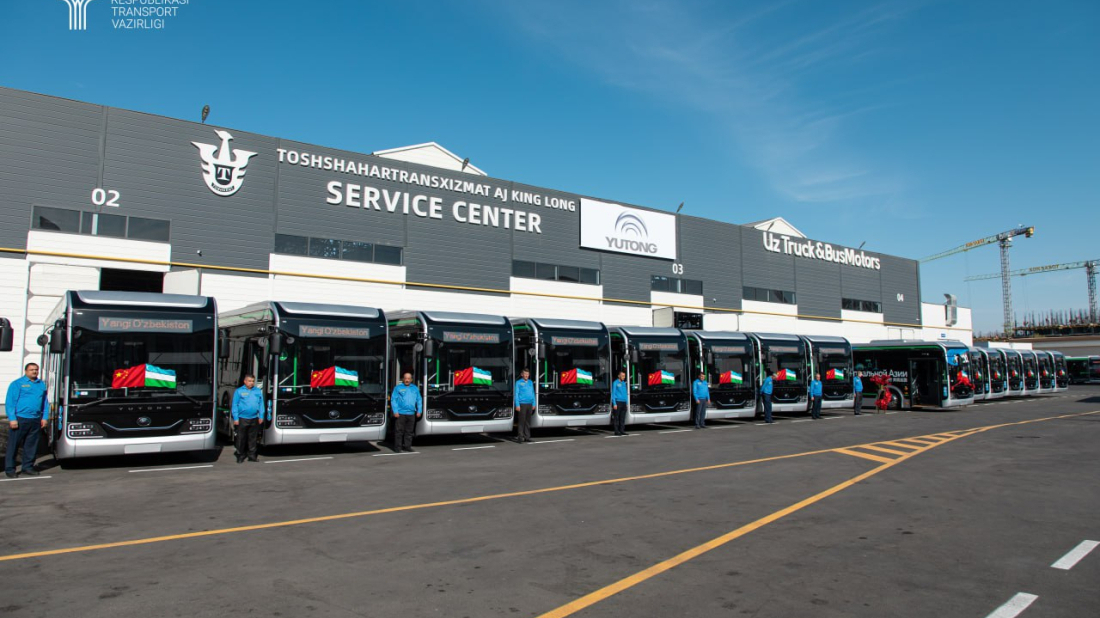Türkiye and Serbia agree to deepen defence, trade and foreign policy ties
Türkiye and Serbia agreed to expand cooperation across defence, foreign policy and economic relations following talks between President Recep Tayyip ...

More than 200 electric buses from China have arrived in Tashkent as part of Uzbekistan’s plan to modernise its public transport system and cut carbon emissions.
The new Yutong buses and 102 charging stations were supplied under a government initiative to support cleaner and more energy-efficient urban mobility.
According to the Ministry of Transport, a total of 202 Yutong electric buses will soon begin operating on 34 routes across Tashkent.
The vehicles are expected to reduce 93.3 tonnes of carbon emissions per month, contributing to the city’s ‘Green Economy Strategy’.
Each bus comes with a three-year factory warranty and is equipped with air conditioning, safety systems, and digital dashboards for improved reliability and passenger comfort.
Officials noted that another 1,000 electric buses are expected to be purchased next year to help achieve the government’s goal of making 50% of public transport electric by 2030.
“The expansion of electric transport will help us improve air quality, reduce fuel costs, and make city travel more comfortable,” a Ministry spokesperson said in a statement.
The delivery also highlights China’s growing role in exporting its clean-energy technologies. In 2024, China exported more than USD 45 billion worth of clean-energy products including electric vehicles, batteries, and solar panels, representing over 60 percent of global EV exports.
By investing in sustainable projects abroad, China is effectively “exporting” its environmental model, and Uzbekistan is among the Central Asian countries benefiting from this cooperation in the transport, energy, and infrastructure sectors.
The new electric fleet also fits into Uzbekistan’s broader effort to strengthen its regional connectivity. With the construction of the China–Kyrgyzstan–Uzbekistan (CKU) railway, which is expected to carry up to 15 million tonnes of cargo annually, Uzbekistan aims to shift from a landlocked to a land-connected country.
The 523-kilometre railway will link Kashgar (China) to Andijan (Uzbekistan) through Kyrgyzstan, reducing freight transit time by up to seven days compared with current northern routes.
Analysts say this will make Uzbekistan a central hub in the emerging green trade and transport corridors of Eurasia.
Uzbekistan’s ongoing projects under its “Green Economy Strategy 2030” focus on developing renewable energy, reducing industrial emissions, and electrifying transport fleets.
The integration of Chinese-made electric buses is seen as a practical step towards achieving these goals, improving both environmental outcomes and regional trade efficiency.
James Van Der Beek, who rose to fame as Dawson Leery in the hit teen drama Dawson’s Creek, has died aged 48 following a battle with stage 3 colorectal cancer.
Canadian Prime Minister Mark Carney said a bridge project linking Canada’s Ontario province with the U.S. state of Michigan would contribute to cooperation between the two countries.
U.S. President Donald Trump and Prime Minister of Israel Trump hosted Netanyahu for closed-door talks focused on negotiations with Tehran, Gaza and wider rBenjamin Netanyahu ended a two-and-a-half-hour meeting at The White House on Wednesday without reaching agreement on how to move forward on Iran.
Mexican Alpine skier Lasse Gaxiola will have his mother for company on his Olympic debut but she will not be cheering him from the finish area in Saturday's giant slalom in Bormio because she will be three hours away preparing her own race.
The suspect in a deadly school shooting in western Canada was an 18-year-old woman who allegedly killed her mother and stepbrother before attacking her former school. Investigators have not provided a motive for what is being described as one of the worst mass killings in Canada.
Türkiye and Serbia agreed to expand cooperation across defence, foreign policy and economic relations following talks between President Recep Tayyip Erdoğan and President Aleksandar Vučić in Ankara.
Plans for sweeping constitutional changes in Kazakhstan have sparked controversy, with civil society representatives accusing the authorities of rushing reforms without sufficient transparency or a clear public mandate.
Azerbaijan’s State Security Service has filed charges against a group of people accused of belonging to a criminal network alleged to have attempted to forcibly seize state power. It's claimed they tried to alter the constitutional structure, with the support of foreign intelligence agencies.
Afghanistan’s Health Minister has urged urgent action to strengthen domestic polio diagnostics and expand healthcare for returnees and vulnerable communities, pressing international partners in Kabul for faster, fully funded support as the country faces mounting strain on its health system.
Iran’s Foreign Minister Abbas Araghchi has firmly ruled out any discussion of the country’s ballistic missile capabilities in the newly resumed, Oman-mediated negotiations with the United States, stating they are not and will never be on the agenda.
You can download the AnewZ application from Play Store and the App Store.

What is your opinion on this topic?
Leave the first comment